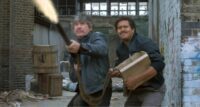I’ve been covering the London Film Festival for three consecutive years now, and although it’s moot to try to ascribe relative value to a curated collection of art, and my own experience of and engagement with the festival was much higher than in previous years (festival attendance reattained pre-COVID highs this year), I might venture to say that this was my favorite London Film Festival yet, measured by the success of the films. There’s not much in it, but by range, mean, mode and median, my ranking of the films of the 2022 London Film Festival paints a marginally better picture than years past.
Therefore, I’ve decided to hand out a few category awards and honorable mentions. For best first feature, though it’s with a heavy heart at snubbing Georgia Oakley’s wonderful and timely film Blue Jean, I would nominate Charlotte Wells’s exquisite exploration of elucidating memory, parenthood, and adolescence, Aftersun. The directorial flair and tact Wells displays is far, far ahead of her years and suggests not a timorous debutante but a fully-fledged artist with the sensitivity and assurance of a veteran filmmaker. I cannot wait to see what kind of career lies in stall, not only for her, but her fantastic cast and crew.
It’s testament to Wells’s brilliance that when removing the caveat of “first film” to find my favorite overall piece of direction I actually end up with a film very slightly less perfect than Aftersun. Still, despite my lingering misgivings about the story, I find myself in accord with this year’s Cannes jury in swooning in astonishment at the style, tone, innovation, subtle performances and visual beauty Park Chan-wook once again brought us from behind the camera of Decision to Leave. A haunting romantic tragedy, every one of the tools of the medium is working overtime in Decision to Leave, with Park and his crew operating like elite silver service dinner staff, serving you the best meal you’ve ever eaten without you ever hearing their footfalls.
For the festivals best pieces of scriptwriting, I’m going to divide my praises into ‘original’ and ‘adapted’ screenplays, in order that I might praise both the character creation, thematic resonance, devastating poignancy and ready wit of The Banshees of Inisherin the most mature and thoughtful work of one of the standout screenwriters of today, and the sublime intellectual, character-driven monologues and visual storytelling of Women Talking. Neither of these verbose scripts omit the necessity of allowing the screen and the actor to breathe interpretative life into their words, and though driven forcefully by their eloquent, indulgent dialogue, neither one stalls into theatricality or literary stiffness. Both these films were directed by their own screenwriters, so it should be little wonder that they had such good instincts in transferring the words to screen, but the words themselves are the substance of both these films, and contribute proportionately to their undeniable power.
The festival also delivered some magnificent documentaries, constructing not fictional worlds but curating and framing our own maddening one, and since I’m making up the rules here, I’m awarding my documentary prize to both Hidden Letters and Getting It Back: The Story of Cymande, two very different, yet equally rewarding works that I was shocked to find myself delighting in as much as any documentary this year (and with Fire of Love and Moonage Daydream out, that’s saying plenty)! Both these films were humane, humorous portraits of passionate people whose love for an artistic tradition becomes both a lens through which they can interpret, and a bulwark against, an unjust, quixotic world, and through these films the message and meaning of the Nushu language and the soul-feeding music of Cymande is promised a rich second life.
The festivals best performances are equally hard to choose between, with standout including Rosy McEwen’s fantastically conflicted performance in Blue Jean, an astonishing dual role for Tarane Alidousti in the sinister psychological thriller Subtraction, the fabulous Vicky Krieps who acts like her life depends on it in More Than Ever, the deliciously sinister, overripe presence of Mark Rylance in Bones and All, the hilariously uncomfortable Kristine Kujath Thorp in Sick of Myself, the superlative lead couples of Aftersun, Decision to Leave, Fast & Feel Love and A Room of My Own, and not to mention the fantastic ensemble casts of Women Talking and The Banshees of Inisherin. But, if forced to single out a single onscreen presence that most enraptured me, I would be forced to concede that there really is only one contender, and that’s Claire Foy, whose barnstorming performance in Women Talking is an absolute force of nature, commanding the screen with every raw, rage-filled word. If I’m going to pursue the arcane practice of gendering my acting awards, then I’ll take the opportunity too to say that Barry Keoghan also stole the show in The Banshees of Insiherin, and that’s quite the heist.
There were some phenomenal film scores on display at this festival too, and it’s another embarrassment of riches picking a favorite with some real heavy-hitters in attendance. Hildur Guðnadóttir continues to prove herself one of the most exciting, innovative and accomplished composers in cinema, with her score for Women Talking more than playing its part in the spell that film casts. Carter Burwell lends his more recognizable sound to The Banshees of Inisherin, providing it with some beautiful accompaniment, fellow established composers Trent Reznor and Atticus Ross giving a hauntingly romantic soundscape to Bones and All, and Matthew Herbert definitely didn’t need to go so hard with his score for The Wonder, which was easily the best thing about the film. Though, as I said at the time, I think Cho Young-wuk’s score for Decision to Leave still stands just a fraction above the rest, doing Bernard Hermann proud in scoring an odyssey of romance and death.
For those who’ve been following my reviews and paying attention though, even to this article alone, there should be no surprises about which film I’d like to see garlanded with the title of ‘Best Film’. The best acted, best written, best everything film of the festival was in my eyes, Women Talking, a righteous, sensitive, defiant, candid, tactful, immaculately birthed piece of feminist discourse that explores fraught subject matter with a generosity and grace we should all aspire to emulate. It’s a triumph for all concerned, rich of spirit and as intensely rewarding as any film I’ve seen this year.
in previous years I’ve concluded by ranking each of the film’s I saw at the festival, in order to quantify the extent of my endorsement but also as a guide to which films I did not see. I did not see The Son, which has proven so divisive, I have not seen The Whale, so beloved, nor Saint Omer, which is on paper the festival’s most unilaterally acclaimed film of all. Nor have I seen She Said, which given my statements throughout this review, it’s fair to assume I would’ve taken considerable interest in. My ranking is my own and subject to changing whims, so oughtn’t be taken too seriously, but we all like lists, so with affection, here’s that ranking, of the 33 films I saw through the festival:
- Women Talking, I’ve said enough already haven’t I? It’s a triumph, I’m in love.
- Aftersun, such a wholesome, tragic experience with so much heart and soul in it
- The Banshees of Inisherin, a beautifully eloquent and tragicomic rumination on insecurity and loneliness
- Decision to Leave, I’d have expected nothing less from the director of my favorite film of almost the last decade
- Getting It Back: The Story of Cymande, great band, great guys, great music, finally getting their flowers
- Hidden Letters, funny, satirical and quietly heartbreaking, the biggest surprise of the festival…
- …that is if you don’t count Blue Jean, a film whose timeliness is equaled only by its power
- Bones and All, fangirls rejoice, Timothee Chalamet gets his shirt off
- Fast & Feel Love, a deeply endearing and guileless blend of rom-com, coming of age movie, sports drama and action movie parody, shouldn’t work anything like as well as it does
- Sick of Myself, a toe-curling satire of self-absorption that hits all the right targets
- Subtraction, a haunting and unpredictable slow-burn psychological thriller that really gets under the skin
- Crows Are White, a poignant and tender exploration of religious dogma and self-deception that puts everything on the line for the truth
- Geographies of Solitude, the most beautiful 100 minutes of a middle aged woman on an island looking at horse s–t you’ll ever see!
- Fragments of Paradise, a sincere portrait of a rewarding life with its heart in the right place
- The Woman in the White Car, a labyrinthine tabletop thriller that keeps you guessing in the right ways
- Causeway, a mostly flattering star vehicle for Jennifer Lawrence in a down to earth drama of healing
- Xalé, an innovative, arresting and daring musical family drama that is a reminder of the refreshing capacity of world cinema
- God Said Give ‘Em Drum Machines, an involving and informative dive into the roots of techno and the trailblazers the industry left behind
- The Queen of Spades, a slow burning piece of cinematic antiquity that builds to a dynamite climax
- After Sherman, a thoughtful, impressionistic look at the history of the American South through black eyes
- Last Flight Home, an uncomfortably intimate view at a beloved family man’s last days
- 1976, a perhaps over-tasteful period drama supported by strong acting and messaging
- Holy Spider, a provocative, unsettling and not entirely successful procedural sure to enrage the right people
- More Than Ever, a sluggish, but occasionally brilliant drama with a fantastic lead performance
- A Room of My Own, a so-so drama knocked out of the park by the two leads
- Leonora Addio, a curious and uneven venture but one with moments of virtuosity
- Unrest, a very slow moving, yet slightly hypnotic treatise on anarchism in a Swiss watch factory
- Enys Men, a repetitive and largely unsuccessful exercise in folk horror
- The Wonder, a collection of moving parts working at cross purposes to create a self important whole
- Ashkal, looks the part but ultimately doesn’t go anywhere with its sense of moral purpose
- Inland, some promising ideas, but again, not satisfactorily fleshed out
- Shabu, I’ll say it, this kid’s annoying
- Utama, a film that wants you to think very hard about its over-simple story
- The Woodcutter’s Story, an unfunny, uninspired story of Job that drags its feet to nowhere




